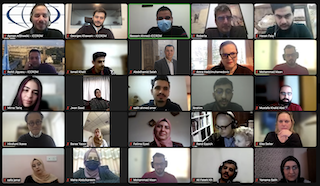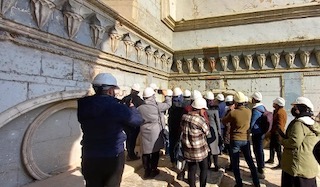As 22 young Moslawi architects and engineers came together for the first in a series of training workshops, they took a significant step towards helping their city recover its cultural heritage.
The three-day workshop marked the start of the first track of training under the Capacity Building for Holistic, Sustainable and Resilient Heritage Recovery of Mosul project – a partnership with UNESCO, under the flagship Revive the Spirit of Mosul initiative, and the University of Mosul, with generous support from the United Arab Emirates (UAE).
Here are some highlights from the workshop, which ran from 17 to 19 January 2022:
Day 1
Following introductions from participants, Project Manager Dr Rohit Jigyasu kicked off the first session with welcoming remarks on behalf of ICCROM. As part of our ongoing collaboration with Nottingham Trent University, Research Fellow Dr Omar Al-Hafith, who is from Mosul, gave an insightful talk about the city’s cultural heritage and history, highlighting the loss of traditional markets and the rich intangible cultural heritage such places hosted.
Mr AbdelHamid Salah, an ICCROM consultant and manager of the risk assessment department at the Egyptian Ministry of Tourism and Antiquities, introduced participants to the topic of protecting heritage during conflicts – a key theme that will be explored further as the course progresses. The first day ended with a powerful presentation from Ms Layla Saleh, who shared her first-hand experience working with armed forces and other non-professional actors to secure cultural heritage in the Nineveh governorate during and after the conflict.
Day 2
The second day consisted of guided visits to three major heritage sites currently being restored by UNESCO. The group met at the Al-Nouri complex, where they were welcomed by UNESCO Senior Project Manager Dr Maria Rita Acetoso and received an overview of the UNESCO project, Reviving the Spirit of Mosul by rebuilding its monumental landmarks, which is rehabilitating the Al-Nouri complex and the Al Saa’a and al Tahera churches, in partnership with the UAE. The takeaway message was that the initiative is not only about reconstructing heritage sites; it is also about empowering the local population to be agents of change and involving them in the process of rebuilding their city through culture and education – aims our course is designed to support.
Accompanied by site engineers and representatives of the State Board of Antiquities and Heritage (SBAH), the participants also visited the Conventual Church of Our Lady of the Hour and the Al -Tahera Syriac Catholic Church. Throughout the day, they completed a field exercise to identify the most significant heritage values of all three the sites, using photos and sketches to help express their visions for each site’s future in their choice of media.
Day 3
The last day began with presentations of the previous day’s field work, followed by discussion and feedback from key resource people such as Dr Amra Hadžimuhamedović, a leading expert in cultural heritage postwar recovery in Bosnia and Herzegovina; Dr Rand Eppich, a practicing conservation architect with a focus on preservation, documentation and international development; and many others who will follow the progress of the participants both online and in Mosul.
Project Coordinator Mr Georges Khawam briefly presented a case study on post-conflict and post-disaster reconstruction in Beirut, Lebanon, providing a different context to highlight the importance of involving the community in decision-making processes to preserve the soul of a city. Project Assistant and Mosul local Mr Bassam Younis shared his dream for the city’s future, which prompted an emotional and touching discussion between all the participants, who as citizens of Mosul suffered unimaginable trauma under the occupation that destroyed their city.
To wrap up the workshop, Dr Rohit Jigyasu introduced several key principles on post-conflict recovery of cultural heritage that tied together the interventions covered, giving participants hope that their city can and will recover, using lessons from the past and from different contexts as a guide.
What’s next
The course will resume in person at the University of Mosul on 27 February 2022. Meanwhile, the participants will be given practical exercises and will meet regularly with the course team both online and onsite to evaluate their progress and discuss their work.
The course runs until October this year, with several more national and international resource persons to share their knowledge and expertise with the participants in Mosul over the coming months.
A second track of training aimed at building the capacity of local craftspeople is also scheduled to begin next month with funding from the European Union.


